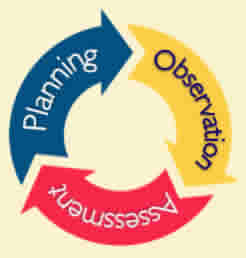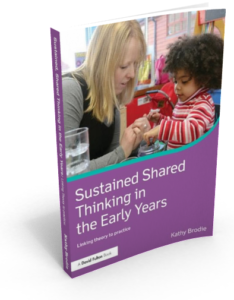Featured
Posted by Kathy Brodie on September 24, 2015.
Kathy Brodie on September 24, 2015.

I often get asked about children’s behaviour.
It is a massive topic, with many facets. However, I would always start from the perspective that all behaviour, good or unacceptable, is a form of communication. It is how we, as practitioners and adults, respond to that communication that makes all the difference.
Click here for more »
Featured
Posted by Kathy Brodie on August 28, 2015.
Kathy Brodie on August 28, 2015.

This week my subscriber list broke through the one thousand mark, which made me sit back and reflect for a moment.
That’s an awful lot of people!
When subscribers sign up, I send them an email, just asking for their most pressing issues and finding out a bit about their concerns and achievements. I will admit at this point that I was a bit dubious about this bit (my husband talked me round though).
What if I was deluged with comments? What if no-one at all replied? What about questions I couldn’t answer?
Featured
Posted by Kathy Brodie on June 11, 2015.
Kathy Brodie on June 11, 2015.

 Observing children is one of the great joys of being an Early Years practitioner.
Observing children is one of the great joys of being an Early Years practitioner.
For example, watching those first steps, hearing how the children are picking up vocabulary (and making up their own syntax) and putting all this together to make sense of their development is usually an exhilarating part of your job.
However, sometimes completing observations can become a chore and not enjoyable at all. This can be due to the way practitioners have been introduced to the observation, assessment and planning cycle and it can result in them doing a lot of unnecessary work.
Click here for more »
Featured
Posted by Kathy Brodie on February 20, 2015.
Kathy Brodie on February 20, 2015.

Whenever I visit settings to do training, or ask practitioners what would make their job role more satisfying, the usual response is “less paperwork”. I have been discussing this with Catherine Lyon, an experienced nursery owner, who has developed her own solution for this problem.
In this guest blog, Catherine explains the rationale for her software as well as its benefits.
Click here for more »
Featured
Posted by Kathy Brodie on October 23, 2014.
Kathy Brodie on October 23, 2014.

Simona McKenzie has posed another interesting question for me: “What should good documentation contain as a summary of children’s learning, that is focussed and shows exactly what the learning journey a child has taken?”
My first thought was that there are certain statutory, legal requirements that all childcare professionals need to fulfil. Namely:
The Department for Education’s Statutory Framework (DfE, 2014: 13) calls for on-going (or formative) assessments based on day-to-day observations of the children, without ‘excessive paperwork’ that is ‘limited to that which is absolutely necessary’. This is incredibly vague and open to interpretation, both by practitioners and Ofsted.
Click here for more »
Featured
Posted by Kathy Brodie on October 13, 2014.
Kathy Brodie on October 13, 2014.

Sustained Shared Thinking is fundamental to good Early Years practice.
It costs nothing, yet research (via the EPPE project) has shown that it improves outcomes for children by supporting their deep level learning and holistic development.
This book clearly explains what Sustained Shared Thinking is and examines the skills and expertise needed to initiate, encourage and facilitate it. It explores the attitudes, knowledge and understanding that a practitioner in any setting should adopt in order to start or develop successful Sustained Shared Thinking.
Click here for more »




 Observing children is one of the great joys of being an Early Years practitioner.
Observing children is one of the great joys of being an Early Years practitioner.

